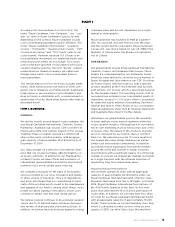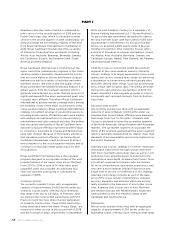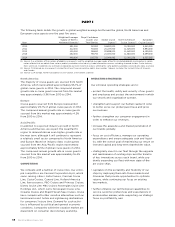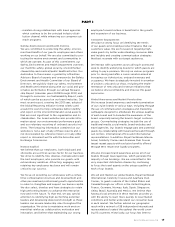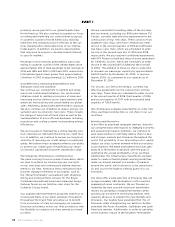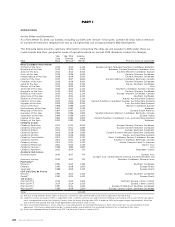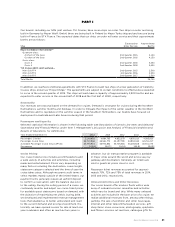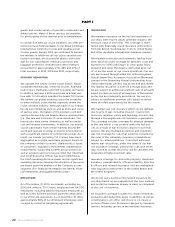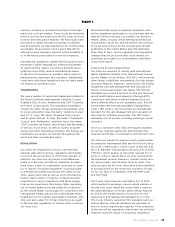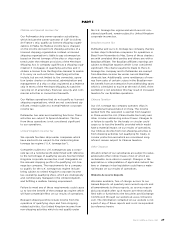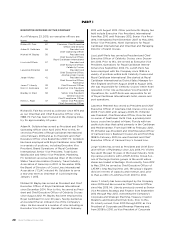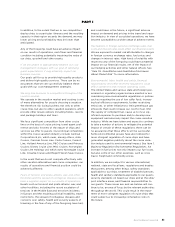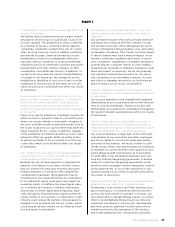Royal Caribbean Cruise Lines 2014 Annual Report Download - page 24
Download and view the complete annual report
Please find page 24 of the 2014 Royal Caribbean Cruise Lines annual report below. You can navigate through the pages in the report by either clicking on the pages listed below, or by using the keyword search tool below to find specific information within the annual report.
Royal Caribbean Cruises Ltd. 23
PART I
industry, increase or decrease from time to time and
tend to be cyclical in nature. These cycles are impacted
both by our own loss experience and by losses incurred
in direct and reinsurance markets. We historically have
been able to obtain insurance coverage in amounts
and at premiums we have deemed to be commercially
acceptable. No assurance can be given that afford-
able and secure insurance markets will be available to
us in the future, particularly for war risk insurance.
International regulations, namely the European Union’s
Passenger Liability Regulations (effective December
31, 2012) and the Athens Convention 2002 Protocol
(effective April 2014) require substantial increases
to the level of compulsory insurance which must be
maintained by passenger ship operators. Maintaining
compliance with these regulations has not had a mate-
rial impact on operating costs.
TRADEMARKS
We own a number of registered trademarks related to
the Royal Caribbean International, Celebrity Cruises,
Azamara Club Cruises, Pullmantur and CDF Croisières
de France cruise brands. The registered trademarks
include the name “Royal Caribbean International” and
its crown and anchor logo, the name “Celebrity Cruises”
and its “X” logo, the name “Azamara Club Cruises”
and its globe with an “A” logo, the names “Pullmantur
Cruises” and “Pullmantur” and their logos, the name
“CDF Croisières de France” and its logo, and the names
of various cruise ships, as well as loyalty program
names and other marketing programs. We believe our
trademarks are widely recognized throughout the
world and have considerable value.
REGULATION
Our ships are regulated by various international,
national, state and local laws, regulations and treaties
in force in the jurisdictions in which they operate. In
addition, our ships are registered in the Bahamas,
Malta or in the case of Celebrity Xpedition, Ecuador.
Each ship is subject to regulations issued by its coun-
try of registry, including regulations issued pursuant
to international treaties governing the safety of our
ships, guests and crew as well as environmental pro-
tection. Each country of registry conducts periodic
inspections to verify compliance with these regula-
tions as discussed more fully below. Ships operating
out of United States ports are subject to inspection
by the United States Coast Guard for compliance with
international treaties and by the United States Public
Health Service for sanitary and health conditions. Our
ships are also subject to similar inspections pursuant
to the laws and regulations of various other countries
our ships visit.
We believe that we are in material compliance with
all the regulations applicable to our ships and that we
have all licenses necessary to conduct our business.
Health, safety, security, environmental and financial
responsibility issues are, and we believe will continue
to be, an area of focus by the relevant government
authorities in the United States and internationally.
From time to time, various regulatory and legislative
changes may be proposed that could impact our
operations and subject us to increasing compliance
costs in the future.
Safety and Security Regulations
Our ships are required to comply with international
safety standards defined in the International Conven-
tion for Safety of Life at Sea (“SOLAS”), which among
other things, establishes requirements for ship design,
structural features, materials, construction, life saving
equipment and safe management and operation of
ships to ensure guest and crew safety. The SOLAS
standards are revised from time to time and the most
recent modifications were phased in through 2010.
Compliance with these modified standards did not
have a material effect on our operating costs. SOLAS
incorporates the International Safety Management
Code (“ISM Code”), which provides an international
standard for the safe management and operation of
ships and for pollution prevention. The ISM Code is
mandatory for all vessels, including passenger vessel
operators.
All of our operations and ships are regularly audited
by various national authorities and maintain the
required certificates of compliance with the ISM Code.
Our ships are subject to various security requirements,
including the International Ship and Port Facility Secu-
rity Code (“ISPS Code”), which is part of SOLAS, and
the U.S. Maritime Transportation Security Act of 2002
(“MTSA”), which applies to ships that operate in U.S.
ports. In order to satisfy these security requirements,
we implement security measures, conduct vessel secu-
rity assessments, and develop security plans. The
security plans for all of our ships have been submitted
to and approved by the respective countries of regis-
try for our ships in compliance with the ISPS Code
and the MTSA.
The Cruise Vessel Security and Safety Act of 2010,
which applies to passenger vessels which embark or
include port stops within the United States, requires
the implementation of certain safety design features
as well as the establishment of practices for the
reporting of and dealing with allegations of crime.
The cruise industry supported this legislation and we
believe that our internal standards are generally as
strict or stricter than the law requires. A few provisions
of the law call for regulations which have not yet been
finalized; however, based on proposed regulations


